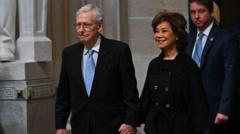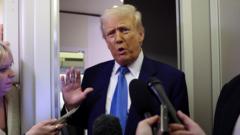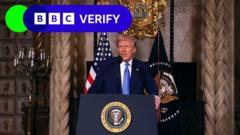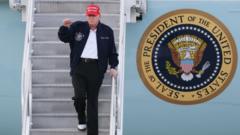Ukrainian President Volodymyr Zelensky has firmly stated that he will not accept any peace agreement negotiated without Ukraine's involvement.
US-Russia Talks Omit Ukraine, Raising Tensions and Concerns
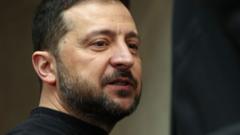
US-Russia Talks Omit Ukraine, Raising Tensions and Concerns
Discussions between the US and Russia about the Ukraine conflict proceed without Ukrainian participation, raising alarms among leaders.
In a significant development regarding the ongoing conflict in Ukraine, a senior Ukrainian government source has disclosed to the BBC that Ukraine has not been invited to the upcoming US-Russia peace talks in Saudi Arabia. Despite previous assurances from US special envoy Keith Kellogg that Ukrainian representation would be included, the current situation reveals no Ukrainian delegation is slated to attend. Instead, European leaders will convene in Paris on the same day, highlighting concerns that Europe may be sidelined in negotiations regarding the war.
The lack of Ukrainian inclusion in these discussions comes amidst a turbulent shift in the US's approach to the conflict. US officials, including Secretary of State Marco Rubio and National Security Advisor Mike Waltz, are scheduled to meet with Russian negotiators in Saudi Arabia following a recent phone call between US President Donald Trump and Russian President Vladimir Putin. This call, marking the end of a prolonged hiatus in direct US-Russia dialogue, has raised questions about the implications of US policy shifts for Ukraine.
In light of these developments, Zelensky has reaffirmed his stance, telling NBC that he "would never accept any decisions" regarding Ukraine made by the US and Russia without his country's participation. While US officials have indicated they are maintaining communication with Ukrainian representatives separately, no announcements have been made regarding Ukraine’s direct involvement in the talks.
Meanwhile, Rubio has characterized the Saudi talks as just a single step in what's likely to be a long process, insisting a comprehensive negotiation framework that involves Ukraine, Russia, and other parties is yet to be established. European leaders, including those from the UK, Germany, and the European Commission, are gathering in Paris for a meeting focused on European security and the situation in Ukraine, with French Foreign Minister Jean-Noël Barrot urging a measured perspective on the outcomes.
Kellogg attempted to mitigate concerns about excluding European leaders from the Saudi talks, stating that past negotiations have often faltered due to excessive participation. However, this has done little to quell fears among European nations about being overlooked in these crucial discussions.
The complexity of the situation is compounded by Trump’s recent statements regarding NATO, where he suggested it may not be "practical" for Ukraine to join the alliance or revert to its pre-invasion borders. This contrasts with Ukraine's ongoing aspirations for NATO membership and the insistence on territorial integrity as prerequisites for any peace deal.
As the political landscape develops, it remains evident that tensions will persist between negotiating parties, especially with Ukraine's critical role seemingly relegated. The humanitarian impact of the war also continues, with recent reports of Russian drone strikes in Mykolaiv leaving thousands without power and heating during severe weather conditions. The conflict, which escalated with Russia's full-scale invasion in February 2022, shows no signs of abating amid these diplomatic uncertainties.
The lack of Ukrainian inclusion in these discussions comes amidst a turbulent shift in the US's approach to the conflict. US officials, including Secretary of State Marco Rubio and National Security Advisor Mike Waltz, are scheduled to meet with Russian negotiators in Saudi Arabia following a recent phone call between US President Donald Trump and Russian President Vladimir Putin. This call, marking the end of a prolonged hiatus in direct US-Russia dialogue, has raised questions about the implications of US policy shifts for Ukraine.
In light of these developments, Zelensky has reaffirmed his stance, telling NBC that he "would never accept any decisions" regarding Ukraine made by the US and Russia without his country's participation. While US officials have indicated they are maintaining communication with Ukrainian representatives separately, no announcements have been made regarding Ukraine’s direct involvement in the talks.
Meanwhile, Rubio has characterized the Saudi talks as just a single step in what's likely to be a long process, insisting a comprehensive negotiation framework that involves Ukraine, Russia, and other parties is yet to be established. European leaders, including those from the UK, Germany, and the European Commission, are gathering in Paris for a meeting focused on European security and the situation in Ukraine, with French Foreign Minister Jean-Noël Barrot urging a measured perspective on the outcomes.
Kellogg attempted to mitigate concerns about excluding European leaders from the Saudi talks, stating that past negotiations have often faltered due to excessive participation. However, this has done little to quell fears among European nations about being overlooked in these crucial discussions.
The complexity of the situation is compounded by Trump’s recent statements regarding NATO, where he suggested it may not be "practical" for Ukraine to join the alliance or revert to its pre-invasion borders. This contrasts with Ukraine's ongoing aspirations for NATO membership and the insistence on territorial integrity as prerequisites for any peace deal.
As the political landscape develops, it remains evident that tensions will persist between negotiating parties, especially with Ukraine's critical role seemingly relegated. The humanitarian impact of the war also continues, with recent reports of Russian drone strikes in Mykolaiv leaving thousands without power and heating during severe weather conditions. The conflict, which escalated with Russia's full-scale invasion in February 2022, shows no signs of abating amid these diplomatic uncertainties.


